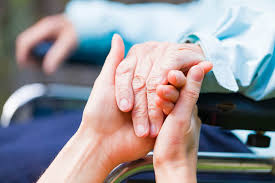Have you ever left a doctor’s appointment or the hospital and just thought to yourself “what in the world did they just say to me?” Your doctor doesn’t intend to confuse you, sometimes they forget to bring the medical terms into everyday terms.
Not only are the terms difficult to understand, but it is difficult to comprehend much after hearing bad news. Most people aren’t fully educated on the terminology used by medical professionals. This along with the feeling that falls over when you hear bad news can create a cloud of confusion for the patient and their family.
We have complied some of the commonly used medical terms you may hear during a doctor’s visit. By understanding their meaning, patients and families can make a more informed decision moving forward. All definitions, unless specified, are taken from Merriam Webster’s Medical Dictionary.

Common Medical Terminology
Diagnosis: “the art or act of identifying a disease from its signs and symptoms.” Doctors assign each diagnosis a formal name such as “cancer”, “COPD”, “cirrhosis”, or “influenza.”
Chronic: “marked by long duration, by frequent recurrence over a long time, and often by slowly progressing seriousness : not acute.”
Terminal: “being at an end; leading ultimately to death; approaching or close to death : being in the final stages of a fatal disease.”
Prognosis: “the act or art of foretelling the course of a disease; the prospect of survival and recovery from a disease as anticipated from the usual course of that disease or indicated by special features of the case.” The likely outcome of the disease over time. Even though doctors have access to the best diagnosis tools, a prognosis is still a best guess. Healthcare providers arrive at a prognosis by taking into consideration:
– All test results
-Previous outcomes of patients with the same diagnosis, age, and health status
– Treatment options
– The patient’s current health status
No one person can perfectly predict the course of a disease or say with certainty when a patient will die.

Palliative Care: “patient and family-centered care that optimizes quality of life by anticipating, preventing, and treating suffering.” -definition from CMS webpage; “medical and related care provided to a patient with a serious, life-threatening, or terminal illness that is not intended to provide curative treatment but rather to manage symptoms, relieve pain and discomfort, improve quality of life, and meet the emotional, social, and spiritual needs of the patient”.
Palliative care should be considered early in the chronic disease process. The goal of palliative care is to reduce symptoms and pain associated with the chronic illness. Palliative care works in conjunction with your primary care provider and any specialists you may see. For more information on St. Anthony’s Palliative Care, check out our webpage here.
Hospice Care: “Hospice is a comprehensive, holistic program of care and support for terminally ill patients and their families. Hospice care changes the focus to comfort care (palliative care) for pain relief and symptom management instead of care to cure the patient’s illness”- definition from CMS page. “a facility or program designed to provide palliative care and emotional support to the terminally ill in a home or homelike setting so that quality of life is maintained and family members may be active participants in care”
Hospice care is not giving up! It is an alternative means of treatment that focuses on treating the person and easing suffering, rather than the disease. Learn more about St. Anthony’s Hospice Care here.

St. Anthony’s Hospice and Palliative Care tailors each care plan to the individual patients. Our goal is to provide optimal end of life care and to give our patients the highest quality of life for however long they are with us. Ensuring each patient has the highest quality of life allows them to share more moments and memories with loved ones and allows them to say everything they need to say.
If you or a loved one is in need of hospice or palliative care, please call us at (270) 826-2326 or make an online referral.
